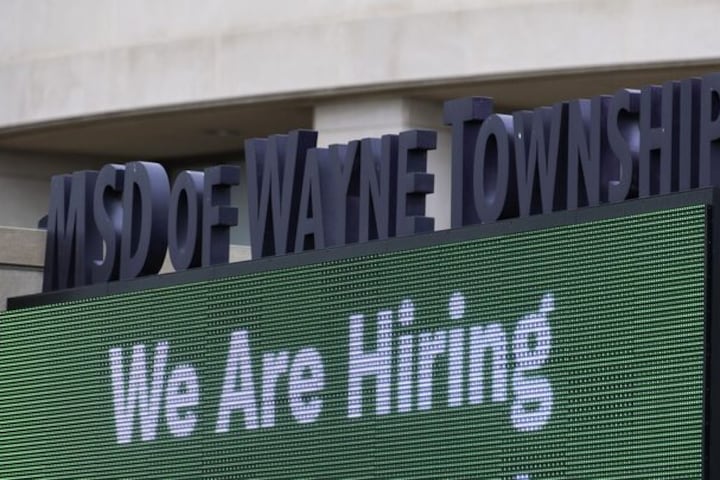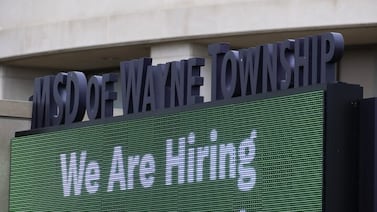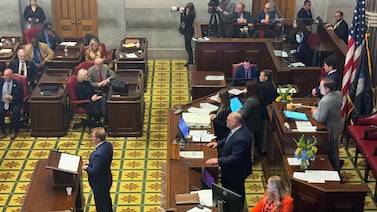Sign up for Chalkbeat Indiana’s free daily newsletter to keep up with Indianapolis Public Schools, Marion County’s township districts, and statewide education news.
This article was originally published by Mirror Indy.
Wayne Township’s school board voted unanimously last week to repeal the westside district’s policy incentivizing “minority and local business participation.”
It comes in response to federal officials’ recent instructions to remove references to race in school admissions, hiring and scholarship decisions, or face a loss of funding.
“The word minority right now is a hot button,” Superintendent Jeff Butts said during an April 14 board work session explaining the proposed policy change. “We’re trying to eliminate lightning rod terminology without eliminating being rational and reasonable in what we’re trying to do.”
The decision comes at a time when the Trump administration’s calls for the removal of diversity, equity, and inclusion initiatives have pushed some schools to minimize the presence of certain programs.
It’s been particularly significant in the higher education landscape where federal funding has already been cut. Many K-12 schools have started wondering if they could be next.
School board members in Wayne Township grappled last week with how to handle their longstanding policy while still signaling to Indianapolis’ diverse westside neighborhoods that their business is welcome.
“This is just the beginning of these types of decisions,” Butts said April 14, “that we’re going to be faced with as we get more and more guidance and more and more direction from our federal department and legal counsel.”
Trump administration pushes against DEI in schools
Wayne Township had the policy for more than 30 years. The board revised its policy in 2014 and reviewed it in 2019.
The policy was meant to encourage companies bidding for work with the district to seek out these businesses as subcontractors.
It defined a business qualifying under the policy as one where ownership was at least half-controlled by a U.S. citizen who belonged to at least one of the following groups: African Americans, Hispanics, Asian Americans, Native Americans, women, Americans who are disabled, and military veterans.
However, in a recent guidance letter, officials with the U.S. Department of Education informed schools that they must cease using racial preferences in admissions, hiring, and other decisions.
The letter comes following a landmark U.S. Supreme Court decision in 2023 that found Harvard College’s race-conscious admissions policy was unconstitutional. And, shortly after taking office, President Donald Trump issued an executive order taking aim at diversity and equity programs.
Federal education officials said in their letter this spring they’ll take a broad interpretation of the Supreme Court case, applying its findings to all considerations of race across school types — preschool through college.
State education officials have also indicated they’ll follow the Trump administration’s lead.
Gov. Mike Braun also signed an executive order just after taking office that said Indiana agencies should not use state funds to support programs based on race. And Chalkbeat Indiana reported this month that state education officials will collect signed forms from schools saying they’ll comply with the Trump administration’s directive.
Federal funds support 14.5% of Wayne schools budget
The Wayne Township board considered keeping their policy, but at least one member felt the changes proposed by their legal counsel would be limiting. With race removed, the board’s policy would only apply to companies managed by women, Americans who are disabled, and military veterans. Their alternative was to scrap the policy altogether.
Board members wrestled with the decision during a brief public work session before their regularly scheduled meeting April 14. Some board members suggested tweaks to language that could keep the policy on the books.
“Personally, I hate to take it out altogether because I feel like our community needs to know that we’re open to minority business,” Vice President Susan Graves said during the work session.
But, the board also weighed the risk of lost federal funds and potential legal challenges should their changes not fully address the intent of changing state and federal orders.
Wayne Township schools receive federal funding to support a range of educational needs. Programs for students of low-income families, students who have disabilities, English language learners, and students experiencing homelessness are all supported by federal funds. There’s also federal support for adult education, career and technical education programs, Medicaid reimbursements, and professional development.
All told, Wayne Township schools received $24.5 million in 2024 to support those programs, making up 9% of the district’s overall budget. Federal child nutrition programs also make up a significant share of federal support, bringing the district’s total federal funding to more than $40 million, or 14.5% of the overall budget.
“The other thing we run into is every single bid that we award could be requested and scrutinized,” Butts said. “We have people that are upset when they don’t get a project and so if they believe that they’ve been discriminated against because the business that we awarded to was minority owned, then actually they can probably do a civil rights complaint and lock us up in civil rights investigations.”
Wayne board took quick action on policy change
Ultimately, the school board moved quickly and unanimously to make the change. They exercised another policy used in cases of “unusual urgency” to bypass multiple readings of the recommended policy removal.
And, though it was Wayne Township’s board making the decision this week, it’s something that could be considered by more districts as federal priorities shift under the Trump administration.
Lisa Tanselle, an attorney from the Indiana School Boards Association, said her organization has gotten a few calls from districts seeking guidance on changes at the federal level, particularly when it comes to serving immigrant students.
The association has not come out with its own guidance specific to diverse hiring, but Tanselle advises schools to consult with their local legal counsel when considering what to do next.
Wayne Township’s decision came during a meeting sparsely attended by the public. Board President Brandon Bowman acknowledged during the April 14 work session the district’s role in helping the public understand the change.
“If there’s feedback from the community,” Bowman said, “then there’s an opportunity to educate folks on what we’re facing and why the decision was made.”
Mirror Indy reporter Carley Lanich covers early childhood and K-12 education. Contact her at carley.lanich@mirrorindy.org or follow her on X @carleylanich.







